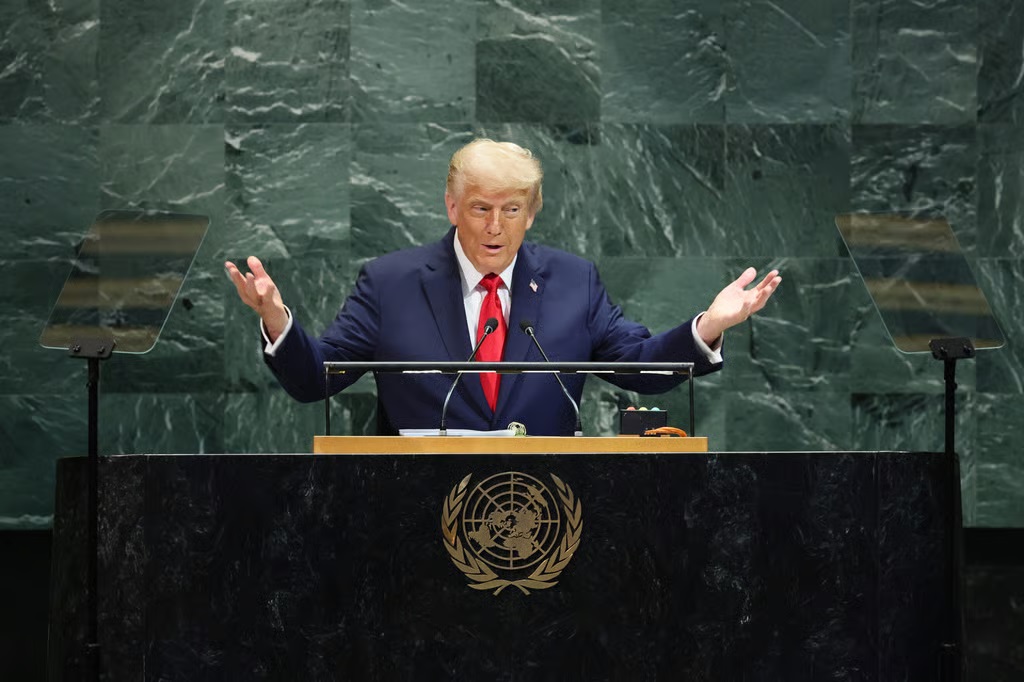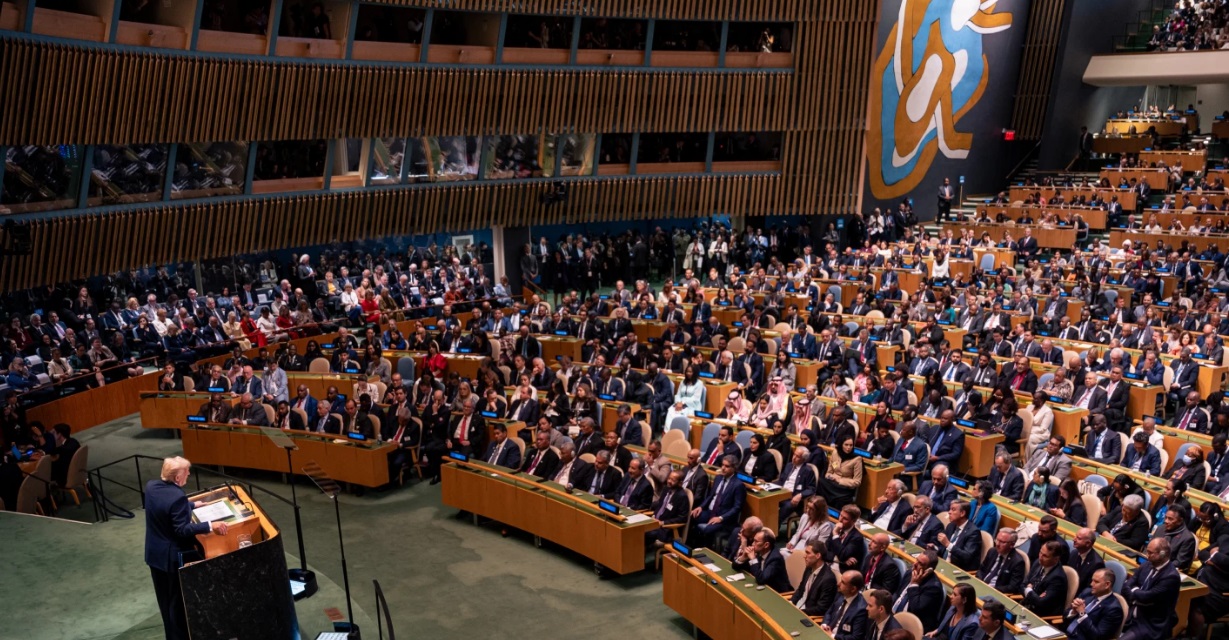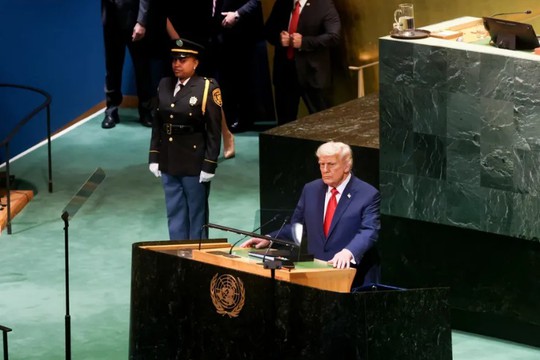Donald Trump during the United Nations General Assembly in New York on Sept. 23.
Photo: Bloomberg
President Donald Trump had barely arrived at the United Nations Tuesday when the mishaps began. First an escalator ground to a halt right as First Lady Melania Trump stepped onto it. Then, as the president took the stage to address delegates at the UN headquarters, he complained his teleprompter broke.
Trump seized on the two incidents to argue how poorly he’d been treated by the world body, complaining its leaders hadn’t helped him end the seven wars he’s repeatedly boasted about bringing to a close. It set the tone for an hour-long speech in which the president excoriated the entire institution, right down to the headquarters he’d sought to renovate decades ago, Bloomberg writes.
The speech was emblematic of a president whose second-term policies and pronouncements have been bigger and more aggressive — and far more disruptive to the global economic order — than those he advanced his first four years in the White House.
Yet world leaders, deploying what’s become a template strategy for managing the emboldened American president, largely ignored most of his speech and stuck to their agendas on climate and trade.
The verbal broadsides marked a remarkable shift from the US president who greeted the United Nations in 2017 with assurances countries should “work together in close harmony and unity” to create a better world, and that “in America, we do not seek to impose our way of life on anyone.”
“Your countries are going to hell,” Trump told the crowd this time around. “You need strong borders and traditional energy sources if you are going to be great again.”
The insults laden throughout the speech were a feature, not a bug. Later Tuesday, while at Trump Tower, the president reposted a social media reply calling it “savage” and a “necessary smack down.”
Although he questioned the role of the UN in his first term, Trump has now helped precipitate an existential crisis for the organization, as it grapples with an explosion of regional conflicts and increasing questions about its relevance. He’s slashed US foreign assistance and the US is now running more than $3 billion behind in paying its United Nations dues.
Trump himself seemed to whipsaw between views that contradicted each other, offering more reasons for leaders not to take the bait. Less than an hour after blasting the UN as woefully ineffective, Trump met Secretary General Antonio Guterres and offered soft assurances that he backed the body. “I may disagree with it sometimes, but I am so behind it, because I think the potential for peace with this institution is so great,” Trump said.
Trump delivered a “scathing speech” marked by “America-first ideology” but also isn’t ready to quit the world body, said Stephen Schlesinger, a fellow with the Century Foundation, a progressive think tank. “That contradiction is that at the same time he instinctively understands he has to be a part of the UN.”
Yet even as world leaders suggested they had no choice but to navigate the order under Trump, they made clear they didn’t necessarily like it. Speaking before the Council on Foreign Relations on Monday, Canadian Prime Minister Mark Carney lamented the US decision to move away from the multilateral system to a more transactional approach.
“I’ll start by admitting up front that we prospered under the old system,” Carney told the audience. “We would like the old system back.”
 Donald Trump addresses the U.N. Assembly.
Donald Trump addresses the U.N. Assembly.
Photo: Getty Images
The United Nations is supposed to be an international forum for consultation, collaboration and compromise. President Donald Trump, though, has a different kind of message for its 190-plus member states: Just do what I tell you.
Migration? Close your borders.
The climate crisis? Forget about it.
Russian oil? Stop buying it.
The American leader issued these strongly worded suggestions — sometimes they felt like orders — Tuesday in his speech to the U.N. General Assembly’s annual summit — the first such address of his second term. He didn’t mince words, POLITICO notes.
Trump had a few lines that sounded more like the expected address of a U.S. president to the world body. He announced that his administration will lead an initiative to try to reduce the existence of biological weapons, and he called on “every nation to join us.”
But that was an exception. Overall, Trump offered no overarching, unifying global vision (his administration had promised a clear, articulate philosophy on the world).
The U.S. president, who looked relaxed and as if he was having a genuinely good time, also used the moment to poke fun at the United Nations’ dysfunction, and it wasn’t just about a malfunctioning escalator.
“All they seem to do is write a really strongly worded letter and then never follow that letter up. It’s empty words, and empty words don’t solve war,” he said.
It is a forum, a venue, for member states to solve problems. And when its leading members — namely the United States, Russia and China — cannot overcome their differences, the U.N. serves little purpose.
If Trump wants the U.N. to function better, he can help make it happen. Instead, he not only acts as if the U.S. has no role, he has taken steps, including holding back funds, that arguably further weaken the multilateral institution.
The Latin American official said the speech in many ways confirms the sense in diplomatic circles that Trump’s approach to the world will continue to be “vibes rather than facts.”
Those vibes, of course, can change within a minute, within an hour, within a single speech.
After all, the same Trump who said the countries assembled before him were “going to hell” wrapped up his speech by declaring: “Every leader in this beautiful hall today represents a rich culture, a noble history and a proud heritage that makes each nation majestic and unique, unlike anything else in human history or any other place on face of the earth.”
Some foreign officials told that, although they were not entirely surprised by Trump’s speech, their concern about where the United States, and the world, is headed for the next three years is only more acute now.
“The world will take it, because the world has no choice,” the European official said.
 Donald Trump during the United Nations General Assembly in New York on Sept. 23.
Donald Trump during the United Nations General Assembly in New York on Sept. 23.
Photo: AP
Donald Trump may have been speaking to the 192 other world leaders gathered in the United Nations, but the real target of his speech on Tuesday was Europe, which was hauled up repeatedly as the whipping boy for an antiliberal, blood-and-soil polemic that renewed an assault on the transatlantic relationship that has become a theme of his second administration, ‘The Guardian’ notes.
In an hourlong address to the assembled world leaders and delegations, Trump told European leaders directly that they were destroying their own countries – and that they should be more like the US as he condemned their policies on immigration, green energy and political correctness.
These were not subtle digs. On migration, he told Europeans that “your countries are going to hell.” On Europe’s approach to climate change, he said it was “on the brink of destruction because of the green energy agenda”. On the war in Ukraine, he said Europe was “funding the war against themselves. Who the hell ever heard of that one?”
“If you don’t stop people that you’ve never seen before, that you have nothing in common with, your country is going to fail,” he said during the speech. “I’m the president of the United States, but I worry about Europe. I love Europe, I love the people of Europe. And I hate to see it being devastated by [green] energy and immigration, that double-tailed monster that destroys everything in its wake.”
But then he turned his gaze to the failures of the United Nations and other world leaders – in which an aide forecast that he would denounce “globalists”. US conservatives would have been delighted to watch Trump tear into European liberals, who were forced to watch and politely applaud as they were accused of gross mismanagement of their countries.
If Trump’s speech did have a foreign policy predecessor, it would be JD Vance’s address earlier this year at the Munich security conference, when the US vice-president launched into a tirade against European leaders over conservative hobby horses including migration and claims that Europe was stifling free speech.
Trump didn’t mention European voters on Tuesday, but he did accuse European leaders of “destroying your heritage” – a claim shared by rightwing groups in Europe with whom the US president and his allies have been increasingly friendly.
“You’re doing it because you want to be nice, you want to be politically correct,” he told them mockingly. Once again, it sounded very much like the administration was seeking to pick a fight with Europe.
read more in our Telegram-channel https://t.me/The_International_Affairs

 10:42 25.09.2025 •
10:42 25.09.2025 •























